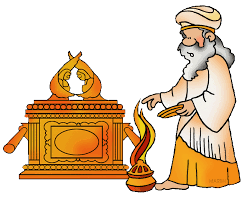Malachi 1:1 – The oracle of the word of the Lord to Israel by Malachi.
Hopefully, you took time to read the introduction to this series, which was posted last week. If so, then proceed on. If not, please take a few minutes to acquaint yourself with the overall history of this passage of scripture.
Our translation says the word of the Lord was an oracle. This is certainly true; an oracle is defined as: The answer of a god or some person reputed to be a god, to an inquiry respecting some affair or future event, such as the success of an enterprise or battle.
 It is also defined as: The communications, revelations or messages delivered by God to the prophets; including the entire sacred scriptures.
It is also defined as: The communications, revelations or messages delivered by God to the prophets; including the entire sacred scriptures.God is certainly about to give a message to his people through Malachi, which concerns current and future events. So the word 'oracle' applies.
But other translations have the word 'burden'. A burden is defined as: That which is borne with labor or difficulty; that which is grievous or wearisome; a heavy load (literal or figurative). This word is also a fitting one for the message of Malachi.
Why would the communication of God to his people be a heavy load for the prophet?
Because this word/oracle is like a dose of bitter, awful tasting medicine. The nation of Israel is sick, but she doesn't even know it! She desperately needs this 'medicine' from God, so she can be restored to good spiritual heath. If Israel doesn't get this medicine, she is in danger of dying. But no one wants to swallow a big dose of bitterness, even if it is beneficial in the long run!
So God uses Malachi in a two-fold way. First, he must confront the Jews with their wrong doing (let Israel know she is spiritually ill) and second, he must deliver a message of repentance and hope (give her bitter medicine, which will heal her).
Now, is there anyone out there who loves to bear bad news to people, even if it is for their own good? Of course not! If you never did anything but bring people bad news, you would very shortly find yourself alone and without friends. But this is the role that Malachi has been assigned by the Lord.
His message is not going to bring him fame and popularity. He is not going to be invited to speak at big conventions. People are not going to follow him on social media, or buy his book. (Well, maybe that isn't quite true since his book is part of the bible, but you know what I mean!)
 While his message is absolutely critical for the people, it is still going to be a hard message for him to deliver, and a hard message for the people to accept. This makes it a burden.
While his message is absolutely critical for the people, it is still going to be a hard message for him to deliver, and a hard message for the people to accept. This makes it a burden.
But the good news is that God is delivering the perfect message, at the perfect time, for the perfection of his chosen people, who have a very great and profound destiny.
Can we stop here and look at our own country, the United States of America?
Can we say that she is God's chosen nation, just as Israel is? Can we say that she, like Israel, is spiritually ill but doesn't even know it? Do you see a parallel between the political, financial and moral situation we find ourselves in right now, and the one the Jews faced so many years ago post exile? I do. I also believe that God has a dose of 'medicine' to give America which may seem bitter going down, but unless we take it, we may die as a nation.
The good news is that God, as we would expect, is delivering the perfect message to us, at the perfect time, for the perfection of his church, because we have a very great and profound destiny ahead of us – the great harvest of souls that will occur before the coming of Christ.
Remember back in our introduction we noted that God skillfully intertwined the spiritual message of Malachi with the religious reforms of Ezra and the political reforms of Nehemiah. These men, under the power and direction of the Holy Spirit, brought about changes in their nation.
I suspect God is doing something similar in America. What is God calling you to do in this hour? Is he calling you to become active politically? Is God putting you in a position to bring reform to the judicial system? Is he calling you to bear a burden of spiritual significance? Is he putting wealth in your hands to be used for the kingdom? Is he calling you to be a voice of repentance in this nation? Do you want to play a part in the great end time harvest?
Do you want to assist in the healing of this nation? There is more than enough 'burden' to go around for all of us.
So read on, and ask God how this Old Testament prophetic book applies to you in this day.
Malachi 1:2-3 – "I have loved you," says the Lord. But you say, "How have you loved us?" "Is not Esau Jacob's brother?" declares the Lord. "Yet I have loved Jacob but Esau I have hated. I have laid waste his hill country and left his heritage to jackals of the desert."
Malachi delivers his message in a very unique way. He could have just stood up and said, "Thus says the Lord", and fired off his whole oracle, but he didn't.
Instead, he engages his listeners/readers in a series of rhetorical questions. This is sometimes referred to as 'discussion speech', because the prophet is giving the word of the Lord in the form of an anticipated discussion of events between the people and God.
In this format, the prophet reveals the true thoughts and feelings of the people, even though they might not want to admit what they are thinking. He gets this information from God, who knows the thoughts of all men. After revealing what the people would say if they were being honest, God then addresses the questions and complaints of his people.
God prefaces his message with a firm assurance of his love. God never changes; his love for his people neither waxes nor wanes, despite the viewpoint of man. Jeremiah says it this way in the King James Version of the bible:
Jeremiah 31:3 - The LORD has appeared of old unto me, saying, Yea, I have loved you with an everlasting love: therefore with loving kindness have I drawn you.
The English Standard Version says it this way: 'I have loved you with an everlasting love; therefore I have continued my faithfulness to you.'
God's love is clearly evident in his actions towards Israel. He set them apart as his chosen people. He made a covenant with them. He preserved and blessed them. He delivered them from Egypt, fed/watered them in the wilderness, and brought them into the Promised Land. We could go on and on, listing the many tokens of love that God has given the Jews. God loved them completely and perfectly at all times.
Yet, the post exilic Jews did not see it that way. They doubted God's love for them because events did not turn out as they expected.
They had indeed returned to Jerusalem, and rebuilt the walls and the temple. But none of the wonderful things announced by the pre-exilic prophets (like a new covenant, a transformation of nature, a state of peace and prosperity under the messianic king) had come to pass. They were not a great and victorious nation. They were not especially prosperous. Messiah had not appeared.
 So they murmured and complained. They chose to ignore the past and present mercies of God. They became thankless and disrespectful. People began to question God's power and providence; they accused God of not loving them.
So they murmured and complained. They chose to ignore the past and present mercies of God. They became thankless and disrespectful. People began to question God's power and providence; they accused God of not loving them.
So the eternal and faithful love that God had exhibited towards his people was returned with ingratitude, disrespect and dishonor. All this is summed up in the question 'How have you loved us?'
God's response is to call their attention to Jacob and Esau. As you recall, these two men were twins, the sons of Isaac and Rebekah. Each one became a nation of people - Jacob's descendants became Israel, and Esau's descendants became the Edomites. Because they were both sons of Isaac and grandsons of Abraham, you would expect both of them to be given similar privileges by God, but that is not the case.
In our English translation, Malachi says that God 'hated' Esau and 'loved' Jacob. This does not mean that God actually hated Esau for no reason. It means that God favored the nation of Israel over the nation of Edom. The words 'hate' and 'love' are not to be taken literally. They are used to show the wide gap/contrast of favor between the two nations.
How did God favor Jacob/Israel? He gave Israel the Law, the covenant, the temple and the prophets, while Edom got none of that. He gave Israel a land flowing with milk and honey, while Edom got the desert and some mountains. Both Israel and Edom were turned over to their enemies, but God restored Israel and left Edom in ruins.
Many scholars see a parallel here between the righteous and the wicked. All people have trouble in this world (the rain falls on the just and the unjust), but God favors the righteous. For the righteous, worldly sufferings have an end, and all of our sorrow will be turned to joy. Not so for the wicked, whose suffering will be endless.
Malachi 1:4 – If Edom says, "We are shattered but we will rebuild the ruins," the Lord of hosts says, "They may build, but I will tear down, and they will be called 'the wicked country', and 'the people with whom the Lord is angry forever'."
Here we see the defiance of Edom. The Lord has allowed them to be destroyed, but in defiance they rise up and declare that they will rebuild.
But God confirms that the Edomites have no hope of restoration. No matter how much labor and money and time they spend in their quest to rebuild, they will not succeed.
God has decreed their destruction because of the way they treated the Jews when Israel was overrun by Babylon. (They captured large numbers of the Jews who had escaped and turned them in to the Babylonian soldiers for profit).
All 21 versus of the book of Obadiah are an oracle against the nation of Edom, but we will just mention one verse here:
Obadiah 10 – Because of the violence done to your brother Jacob, shame shall cover you, and you shall be cut off forever.
Sure enough, Edom was eventually overtaken by Babylon just as Israel had been. Yet, in the fullness of time, Israel is restored to her own territory, while Edom ceased to exist. Only the providence of God could accomplish this.
Daniel 2:21 - And he [God] changes the times and the seasons: he removes kings, and sets up kings.
Clearly, God loves and favors his chosen people over all other nations.
The difference in favor shows itself again when the former Edomites are branded as a 'wicked country' and 'the people with whom the Lord is angry forever'. Consider this: God was angry with both Edom and Israel; His anger resulted in the destruction of both nations.
But God's favor and purposes rested with Israel so he used her exile in a positive way (to remove the sin of idolatry amongst other things), and then restored her as promised.
As her Father, he disciplined her, in order to train her in righteousness. He helped her mature, so she could be trusted with even more favor. He prepared her for the coming Messiah, so that all nations could be blessed through her, just as He had promised in his covenant with her.
Thus we see that God has been completely faithful to his promises:
Psalm 89:31-34 - If they [Israel] break my statutes, and keep not my commandments; then will I visit their transgression with the rod, and their iniquity with stripes. Nevertheless my lovingkindness will I not utterly take from him, nor allow my faithfulness to fail. My covenant will I not break, nor alter the thing that is gone out of my lips.
Meanwhile, Edom was wiped from the face of the earth – forever. How then, can the Jews of the post exile period claim that God does not love and favor Israel?
Malachi 1:5 – Your own eyes shall see this, and you shall say, "Great is the Lord beyond the border of Israel!"
The difference that was evident in God's dealings with Israel vs Edom was just one instance of God's favor upon them. There had been many, many instances in the past, and there were more examples yet to come. Future generations would also recognize God's favor upon them, and give him glory for it.
So the word of God through Malachi begins with a factual statement of His love and favor. What other nation had been chosen by God besides them? What greater honor could there be than to be the people of God, the embodiment of his blessings? And what did Israel do to deserve these benefits? The answer is NOTHING. Thus, God has made a case for his undeniable love and favor of Israel. He now goes on to reveal the unthankful attitudes and actions of his people, despite that love and favor.
Malachi 1:6 – "A son honors his father, and a servant his master. If then I am a father, where is my honor? And if I am a master, where is my fear? Says the Lord of hosts to you, O priests, who despise my name. But you say, "How have we despised your name?"
Let's consider the relationship between parents and children. There is a strong law of nature present in that relationship. A child automatically loves his parents. He will naturally look up to them, believe them and trust them. (Sadly, this occurs even when the parents are abusive.)
If the parents are good, loving parents, that love and respect continues to flourish and grow as the child grows. There will be times of correction/discipline and times of teaching, but that does not diminish the love of the child for the parent. If anything, it causes it to increase.
Now, there can be no doubt that God is the father of the Jewish people:
Isaiah 63:16 - Doubtless you are our father; you, O LORD, are our father, our redeemer; your name is from everlasting.
John 8:41 - You do the deeds of your father. Then said they (the Jews) to him, We are not born of fornication; we have one Father, even God.
If God is Father, and Israel is his child, then we would automatically expect certain things to be true of that relationship. We would expect Israel to love God. We would expect them to look to God for provision, protection and guidance. We would expect them to believe in God and to trust Him. We would also anticipate certain times of correction and teaching to occur. And all through this process, we would see love flourish between God and his children.
But through the prophet Malachi, God himself declares that despite his perfect parenting, Israel exhibits no love towards him! She is cold and heartless. She denies his love, scorns his correction and does not trust him.
Hmmm... perhaps Israel looks at God more like a master than a father. That too, is a fitting role. If God is the master then Israel was his servant. What natural laws govern the master/servant relationship? Respect and obedience. The servant will fear and/or respect his master and will act accordingly by doing the master's bidding/will.
But again, God declares that Israel does not even treat him like a servant treats his master! They neither fear nor respect him. God declares that Israel is guilty of ingratitude and contempt.
Here, I offer a word to the wise for our generation. God is both our Father and our Master. We are both his children and his servants. A mixture of both reverent love and respectful fear is due to Him. Yes, we can rest in his love, but we also need to be about the business of his kingdom – spreading the good news of the gospel, making disciples of all men and baptizing in the name of the Father, the Son and the Holy Spirit.
Did you notice that here in verse 6, the Lord seems to shift focus? At first, it seems as if he is addressing all of the Israelites, but now he seems to be speaking specifically to the priests. Why is this significant?
 If the nation of Israel was a group of servants unto the Lord, then the priests were like a special subgroup of servants. They had the privilege of standing before God, when no one else could. They were the ones who stood in the gap between man and God. They had access to the covenant, and they were charged with the task of knowing and teaching its laws to the people. They were to enforce sound doctrine. They were to live lives of holiness as an example to their fellow countrymen. They were to keep God's name sacred among the people. They were spiritual leaders; they were to lead the nation in honoring and fearing the Lord.
If the nation of Israel was a group of servants unto the Lord, then the priests were like a special subgroup of servants. They had the privilege of standing before God, when no one else could. They were the ones who stood in the gap between man and God. They had access to the covenant, and they were charged with the task of knowing and teaching its laws to the people. They were to enforce sound doctrine. They were to live lives of holiness as an example to their fellow countrymen. They were to keep God's name sacred among the people. They were spiritual leaders; they were to lead the nation in honoring and fearing the Lord.
When they fail to be good children/servants to God, the rest of the nation follows their example. If they are corrupt, then we can be sure the entire nation was corrupt too.
Therefore, correction/discipline of the priests is of the utmost importance and must come first; reformation of the common people and the nation hangs upon the reformation of the priests.
And what a horrible example they set for the nation! The spiritual leaders of the nation actually despised the very name of God. To despise means 'to look down upon with disfavor or contempt, to scorn, to undervalue; to have a low opinion of'.
Ask yourself these questions: If the priests scorned and looked down upon God, what kind of service do you think they gave him as they served in the temple? How seriously did they take his laws? How effective were they in teaching the law among the people?
Here is another question: Why should we care about the service of some priests who turned to dust long, long before our great-great grandparents were born?
Because you and I are the priests of today!
1 Peter 2:9 – But you are a chosen race, a royal priesthood, a holy nation, a people for his own possession, that you may proclaim the excellencies of him who called you out of darkness into his marvelous light.
Look around you. Our nation is in turmoil. It no longer acknowledges God as either Father or Master. Why is that? Could it be that the church has not been taking her duties seriously?
We have the privilege of standing before God, with access to his throne room; we are to stand in the gap for lost souls. Do we? How concerned are we with the lost?
We are to live lives of holiness as an example to our fellow countrymen. We are to hold God's name and his reputation as sacred among the people of our society. Do we? Or do people have a hard time seeing the difference between the church and the world?
We have access to the new covenant, and we are charged with the task of being a force for holiness and righteousness in our generation. This requires us to be active in every aspect of our society such as our schools, our courts, our businesses and our political system. Are we using our positions in society to promote holiness and righteousness?
When the world tries to promote evil, does it fear a battle with the church, or does it just assume we will roll over and let them do as they please?
Could it be that reformation of America hangs on reformation of the church?
When God confronts Israel's sin through the prophet Malachi, they respond, 'how have we despised your name'?
Now, this is a key question. If they ask this question with a humble desire to really understand what they were doing wrong, that would have been good. It would have displayed an attitude of remorse and repentance. It would have indicated they were ready and willing to change their ways.
But they asked the question with distain and defiance, refusing to acknowledge their own sin. And that's a problem because if they don't acknowledge their sin, they won't be able to repent. Their only option will be to harden their hearts against God's call to repentance.
But God is merciful and gracious. He will reason with them, and give them specific examples of how they are despising his name. He will be very clear about the charges he is bringing against them. God desires for them to see and repent, but if they don't God will be clearly justified when he judges them.
But, before we get into the specifics of their wrong doing, I want to stop here and apply what we have learned to our own situation.
The first thing we saw in this chapter was God reaffirming his love for his people. There was clear evidence of this love all around, but the people chose to ignore the evidence. They were busy having a kind of pity party, because events after the exile did not turn out as they expected.
What does a self examination reveal to you? Are you now, or have you ever, indulged in a kind of spiritual pity party, when God did not give you what you wanted? Was there ever a time when things did not turn out the way you thought, and so you accused God of doing you wrong or not loving you?
I fully and freely admit that when things don't go my way, it is irritating. And it is tempting to question God's ways during those times. But now I see that when those times come, it is my job to look at the facts objectively, by looking over God's past dealings with me and seeing all of the tokens of love that he has given me. When you do that, it is easy to see that he loves you and he is working things out for your good!
What about our nation? Is anybody besides me extremely unhappy with what is going on in our nation's capital and in its highest offices? Anyone blaming God for that? Anyone grumbling because God has not done what we expected, as a result of our prayers for the nation?
If so, you should be very, very careful. In fact, I would immediately stop the grumbling and repent. You can be absolutely certain that heaven received your prayers:
1 Peter 3:12 - For the eyes of the Lord are over the righteous, and his ears are open unto their prayers: but the face of the Lord is against them that do evil.
You can also be absolutely certain that God is in control of events and He is working behind the scenes in America, even if you don't see it! God loves America just as much as he loves Israel and he is bringing about his purposes in his own way. This may involve correction of his church. In fact, I am going to go out on a limb here and say that it will most definitely involve correction for the church.
The church in America seems to be complacent. Where were we when evil was voting for abortion and gay marriage and prayer-less schools? How effective and active are today's churches in spiritual warfare? When did we decide that we could effectively run the church and be victorious without the direct supervision of the Holy Spirit?
I firmly believe that God is working in America to bring about change, but part of that plan is going to require us to change as well. God is calling us to enroll in spiritual boot camp. He is calling us to wake up and start learning how to fight back the forces of evil. He will direct the battle, but we must do our part by fighting.
In the scriptures, David credits God with teaching him the art of warfare:
Psalms 18:34-40 – He [God] trains my hands for war, so that my arms can bend a bow of bronze. You have given me the shield of your salvation, and your right hand supported me, and your gentleness made me great. You gave me a wide place for my steps under me, and my feet did not slip. I pursued my enemies and overtook them, and did not turn back till they were consumed. I thrust them through, so that they were not able to rise; they fell under my feet. For you have equipped me with strength for the battle; you made those who rise up against me sink under me. You made my enemies turn their backs to me, and those who hated me I destroyed.
God is ready to train the modern church in warfare. Part of that will be of a spiritual nature, part will be religious reform and part will be in the political/business/worldly realm. So I encourage you - don't wait for the draft – enlist today, because Uncle Sam truly needs you!
Let me offer you some encouragement:
Back in the days of Malachi, God's people had a choice. They could accept the medicine that would bring healing to them (even though it seemed bitter at the time), or they could give up and die. I believe that we, as individuals and as a nation, are facing the same choice. This battle can be won. We can be victorious. I encourage you to be an active part of what God is doing right now!
Let me offer you some relief:
God has never lost a battle - so get on the winning side! Draw close to God, learn to hear his voice, spend time in his presence and follow where he leads!
Let me offer you some strength:
We all want our children and grandchildren to inherit a nation that is righteous and blessed by God. Even though things look a bit hopeless right now, we can still give them that - but it is going to take effort on our part. So don't give up. Instead, get involved in what God is doing today!


